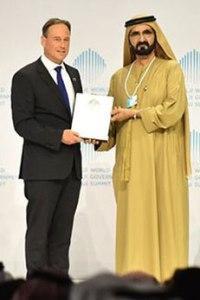
Our Most-Bestest Minister Ever
Australia has an appalling environmental record — hell, I have even written an entire book on our sorry state of environmental affairs. Of course, environmental damage is a slow accumulation of bad political decisions, neglect, corruption, greed and society’s general I-couldn’t-give-a-shit attitude, but the record of our recent government demonstrates not just classic political buffoonery and neglect, but an outright attack on the environment.
So it was impossible to restrain a disgusted guffaw when, in February this year, our ‘Environment’ Minister won the coveted ‘Best Minister’ in the World award at the World Government Summit in Dubai by Sheikh Mohammed Bin Rashid Al Maktoum, Vice President and Prime Minister of the United Arab Emirates and Ruler of Dubai.
Deserved ridicule aside, I was asked recently by The Conversation to contribute to a special report examining the profile performance of cabinet and shadow cabinet ministers, which is not only a responsibility I take seriously, but an honor to be able to provide a serious and objective appraisal of our Most-Bestest Minister Ever. My contribution dealt specifically with the environmental portfolio, so I appraised both the sitting Minister and the Shadow Minister. Judge for yourself based on their performances.
Greg Hunt – Environment Minister
Hunt has spearheaded every main Coalition policy affecting the environment, including voting against a carbon price, the Carbon Pollution Reduction Scheme, legislation to increase protection for freshwater and marine reserves, investments in renewable energy (by lowering the renewable-energy target), carbon farming and fishing restrictions.
Hunt implemented policy that supports and streamlines developments such as unconventional gas. He has supported the development of large-scale coal mines and commodities ports, despite evidence for their contributions to environmental degradation and climate disruption.
Hunt axed the Climate Commission as one of his first duties as minister. He then implemented a replacement policy for the previous government’s carbon price – Direct Action – which many experts consider to be weak and ineffectual by comparison. He has regularly stated that under his leadership Australia is a leader in tackling climate change (it is not). In fact, Australia’s emissions are increasing.
During Hunt’s time as environment minister, the government removed management plansfor a national network of marine reserves, directly attacked wind farm development, attempted to remove the rights of environmental groups to challenge development approvals, removed funding from the only independent legal body representing environmental interests, tried to remove the tax-free status of environmental NGOs, attempted to remove World Heritage status from Tasmanian forests and attempted to overturn the Illegal Logging Prohibition Act.
On the other hand, Hunt oversaw the introduction of new protections for water from development and a new long-term plan for the Great Barrier Reef. This played a role in keeping the reef off the World Heritage “in danger” list (coal and port developments near the reef notwithstanding). He has overseen the roll-out of the government’s “Green Army”, at the expense of Landcare funding. It pays its “soldiers” less than the minimum wage.
In 2014 he established a Threatened Species Commissioner (Gregory Andrews). Through this vehicle, Hunt has declared war on feral cats as the primary means to limit mammal extinctions (Australia has the world’s highest mammal extinction rate), despite no clear plan for how to achieve meaningful cat reductions that would decrease the extinction risk of native species.
Despite some small, well-publicised policies that largely focus attention away from Australia’s abysmal environmental performance, Hunt has – on balance – favoured his government’s objectives of deregulation and economic growth at the expense of the environment. – Corey Bradshaw
Mark Butler – Shadow Environment Minister
Like his ministerial counterpart, Butler votes firmly along party lines, essentially gain-saying any position held by the Coalition government.
Contrary to the Coalition’s policies, however, Labor generally has a much stronger scientific basis underlying its principal environmental policies – the Carbon Pollution Reduction Scheme perhaps being an exception. While the Gillard government’s carbon pricing policy was arguably insufficient, it had already demonstrated in its brief existence that it was a clearly superior way of reducing Australia’s emissions compared to the Coalition’s Direct Action plan.
While receiving relatively little media attention since 2013, Butler has been a regular and vocal opponent of Greg Hunt’s policies. This includes challenging the Coalition’s various climate change-mitigation inadequacies, calling out Prime Minister Malcolm Turnbull’s lack of climate action in the shadow of Tony Abbott, denouncing the latest CSIRO decision to axe most of its climate modellers, countering Hunt’s erroneous claims of meeting carbon-reduction targets, and attacking the reduction in the renewable energy targets.
Butler has, however, been much less critical of Hunt’s other environmental policies and has instead focused mainly on the Coalition’s climate-mitigation failures.
CJA Bradshaw

